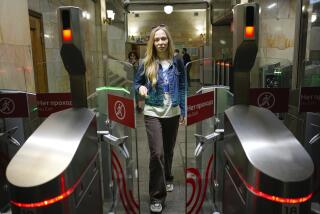Singapore Says Its Information Net Will Amaze : Communications: But opponents say its ability to track citizens smacks of Big Brotherism.
- Share via
SINGAPORE — By 2005, Shoppers may not need to try on new clothes before buying them.
Instead, when customers choose the cloth and cut of suits, they will see, on a large wall screen, a computer-generated image of themselves wearing the finished product.
If they decide to buy, the price will be automatically deducted from their bank accounts.
It may sound like a futuristic fantasy, but government officials say that under a plan to turn Singapore into a world leader in information and communications technology, such screens could become as common in the city-state as the telephone.
“Within 15 years, Singapore will be an intelligent island,” said Tan Chin Nam, chairman of the state National Computer Board and managing director of the economic development board.
The government recently announced a plan to lay down a communications network linking all households with grids of fiber-optic cables that enable high-speed exchange of text, sound, video and other media forms.
“It will be among the first countries in the world with an advanced national information infrastructure,” Tan said as he unveiled the NII plan.
In addition to the cables, a wireless communications network will cover the whole country, giving users of mobile computers access to information services.
The NII project is part of Singapore’s drive to develop an economy based on information technology.
Government officials say that just as roads and railways were essential for industrialization in the past, so electronic grids will become the backbone of 21st Century economies.
Not all Singaporeans support the government’s electronic city plan. Some evoke images of the thought police of George Orwell’s “1984.”
“The government will be able to track every move of citizens if they want to,” complained one office worker. “Privacy will be invaded if electronic Big Brothers keep tabs on people.”
Singapore has already issued all citizens 18 and older an identity card that makes it possible for information about them to be cross-indexed between ministries and government bodies.
Under the NII plan, various state bodies, such as the police, the Registry of Vehicles and the income tax and immigration departments, will not only be linked to each other, but also to business organizations and households. These will file tax returns and apply for licenses and permits electronically.
“I think some investors will pull their money out of Singapore if secrecy is not guaranteed for their financial transactions,” said a manager at Kay Hian James Capel.
“Information is the currency of the new age,” said the official report on information technology.
“Just as gold, silver and other precious metals are regarded as valuable commodities, so now is information,” it said.
As an example of how the network could be useful, it gave as an example of a researcher writing a history paper.
The researcher would be able to incorporate texts, images and sound recordings from the national archives as well as photographs from newspaper publishers and video footage from broadcasting companies--all without moving from his study.
“Artists and authors would also be more fairly compensated, as the system will be able to automatically credit royalties every time their materials are copied,” the report added.
The groundwork for making the country an electronic island has already been laid, helped by the country’s small size, a highly centralized bureaucracy and the government’s determination to speed computerization.
Singapore’s Portnet and Tradenet data exchange systems allow vessels, shippers and companies to discard paperwork and submit documents electronically to port and trade authorities.
A spokeswoman for the Trade Development Board said many freight forwarders reported productivity gains of up to 30% from electronic networking, because it slashed the average time to process documents from two days to 15 minutes.
An audit carried out in 1988 showed that the Civil Service Computerization Program gave the government a return of $1.30 for every 60 cents spent on information technology.
More to Read
Sign up for Essential California
The most important California stories and recommendations in your inbox every morning.
You may occasionally receive promotional content from the Los Angeles Times.










